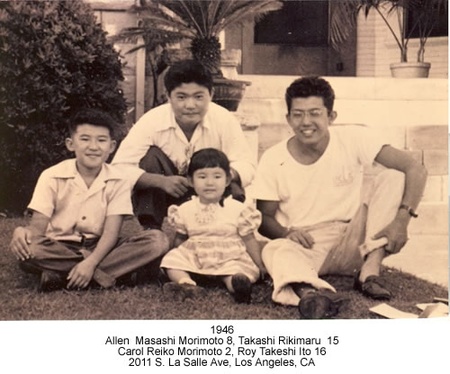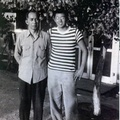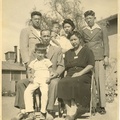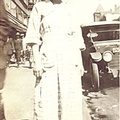>> Part 1
After a few days, I went to the Social Security office to obtain a Social Security card because I had learned that you had to have a card to be employed and I wanted to work. I obtained the card under an alias because I wasn’t supposed to work on my visitor’s pass from camp and also I was under age to be working. I chose the name Fred Itano because it was short and easy to remember. I got the card without any questions being asked. Using the classified advertising section of the newspaper, I spent the whole day searching for a job. Each place I went to wanted someone with experience. After searching for two more days, I finally got a job at the Frost Rubber Company on Halstead Avenue not too far from where I was living. Working hours were from 3:30 p.m. to 1:30 a.m.
The Frost Rubber Company was a small manufacturing firm making rubber parts and encasing electrical wire with rubber insulation. It was hot and dirty work. Raw untreated rubber sticks together and therefore has to be covered with a powder to keep the rubber sheets used in production manageable. This powder was everywhere in the plant. The heat generated from the hot molding presses made the hot and muggy Chicago weather even worse. In the powdery plant, I would become covered with sweat from the heat and the powder would stick to my body and clothes. No showers were provided, so it was necessary to clean yourself the best you could in the washbasin before going home.
My job was to put eight six feet long rubber strips into a mold in a large hydraulic press, covering the mold with a sheet metal plate then operating the press to vulcanize the rubber strips. To this day, I do not know what the rubber strips were or the purpose they served. The press was on the basement floor of the plant apart from the other presses, so I was isolated from the other workers and the work required my attention only for five minutes every 20 minutes. Under those circumstances, I had plenty of time to think. This job presented the hard reality of working in a factory. There were many middle aged and older men working and sweating at the same mindless job as me with nothing better to look forward to. I thought to myself that this was plain hell and that I would do anything to spare myself of having to work at some factory job the rest of my life.
I remember a young black guy about 18 or 19 who would sneak down to talk to me whenever he could. He would often talk about his older sister who he admired so much because she was a high school graduate, as if high school graduation was an outstanding achievement.
After getting off work at 1:30 in the morning, I would ride the elevated back to the Takada’s. When I got there, the sofa bed was opened, so I would try to clean up with a wet towel and try to go to sleep. I wanted to take a bath, but it was too much of an imposition on Mr. and Mrs. Takada to bathe at 2:30 in the morning.
Andy frequently returned home from his job bussing dishes at a fancy French restaurant named Jacques about the time I did. Oftentimes he would tell me of the humorous experiences he had at the restaurant that day and make me laugh before I went to sleep.
On Saturday nights, I usually went over to the Hikawa’s and we would go out on the town walking around in the Loop, seeing a movie, playing pool at the small pool hall on Division Street or hang out at the Japanese café at Clark and Division. Seeing big city life with the many different people from all walks of life as a 15 year old was very exciting. I was particularly fascinated with the many bums on the streets. They provided further motivation for me to get a college education.
In late August, I received a letter from my brother, Hiro, who was in the Army stationed at Fort Snelling, Minnesota, attending the Japanese language school for interpreters. It was getting late in the summer and since I needed to get back to camp, Hiro wrote that I should visit him at Fort Snelling before his week’s furlough to see what it was like. He said that he would meet me in Minneapolis the following week. I therefore quit my job, got my final paycheck, and bought a dressy maroon gabardine shirt and a pair of beige slacks I could wear on the train to Minneapolis.
Decked out in my new traveling outfit, I got on the train to Minneapolis. The trip up north through Milwaukee and the Minnesota countryside was very pleasant. We stopped briefly in St. Paul and then arrived in Minneapolis a short time later. Unknown to me, Hiro thought that I was going to get off in St. Paul and was waiting there for me. When I got off in Minneapolis, I decided that Hiro was simply late in getting to the station and since I was hungry, I went into the coffee shop at the station for a sandwich. I learned later than Hiro had me paged in the station but I couldn’t hear the page in the coffee shop. I waited in the train station for three hours when Hiro finally arrived along with his friend Junior Iwasaki. It was after 10:00 o’clock before Hiro registered me in the YMCA hotel for the night and hurried back to Fort Snelling for the nightly bed check.
Rooms were apparently scarce at the YMCA and for whatever reason they put me in a room with another guy about 30 who talked to me while sitting on his bed in his underwear. He was sort of a strange person but nice enough. We were on the ninth or tenth floor with the window open to let in the cooler night air. I went to the window to see the street below and an unexplained urge came over me to jump out of the window. Whether this urge was due to my phobia for height, the dreamlike quality of the day, or the hypnotic effect of the street scene below, the urge remained for several minutes until I could tear myself away from the window with a shudder. The guy in the underwear didn’t know that I was experiencing this urge that only proves that one never really knows what others are thinking at any given moment.
The next morning Hiro came after me and we went to Fort Snelling where I saw many Nisei soldiers who attended the Japanese language school. Since it was Saturday, the troops got in formation and went through maneuvers before being dismissed for the weekend. Having a week’s leave, Hiro, Junior and I got on the train back to Chicago. Many of the soldiers from the Fort were on the train with us. We all stayed in the club car and one of the Nisei soldiers from Hawaii brought out his guitar and serenaded us with Hawaiian and popular songs all of the way to Chicago.
Upon arrival at Chicago, Hiro rented a car and then picked up Andy and David Takada, Sho Nakashima, another friend from the old Los Angeles neighborhood and we spent the day seeing sights in Chicago, bowling, and stopping at the Nisei coffee shop mentioned earlier as a Nisei hangout.
After the weekend in Chicago, I said my farewell to all my friends and the Takadas and Hiro and I took the train back to camp. On the trip we reminisced about our easy carefree pre-war life, the family and friends. This was the first time he really talked to me as a person and not as a punk kid brother which was nice. Hiro left camp after a few days to get back to Fort Snelling and I got ready to go back to Los Angeles. My father apparently felt that I had matured enough to make arrangements on my own to take possession of our house in L.A. from the realtor so that we could move into it again.
The summer of 1945 is most memorable – I grew up that summer. I regret not seeing Mr. and Mrs. Takada again because I wanted to thank them for putting me up that summer or else I probably wouldn’t have had that great life experience.
April 14, 1987
© 2008 Roy T. Ito






